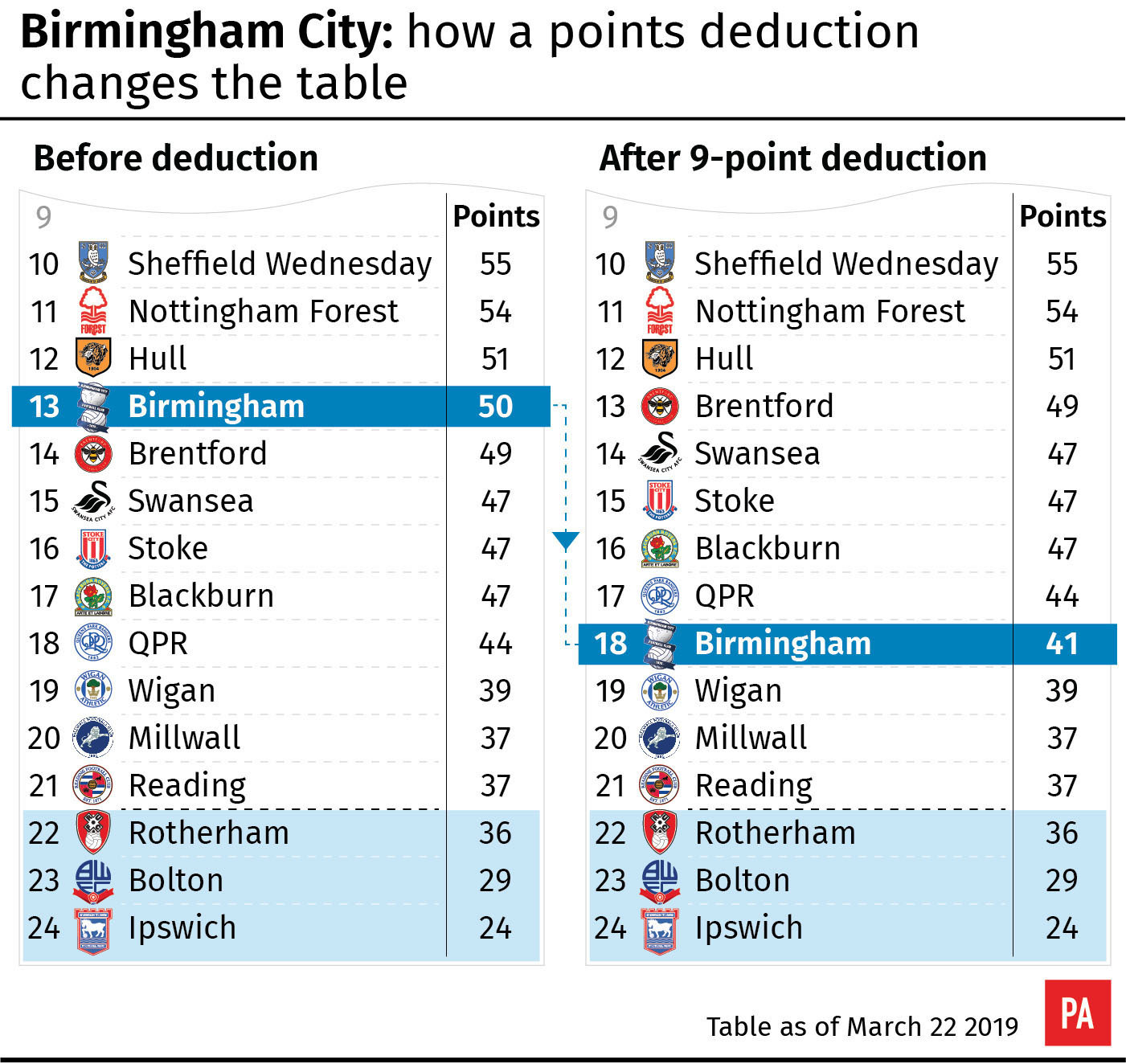Birmingham deducted nine points after breaching EFL financial rules

Birmingham have been docked nine points after breaching financial rules, the EFL has confirmed.
The Sky Bet Championship club breached the league’s profitability and sustainability regulations and faced a possible 12-point deduction and a transfer ban.
The penalty sees the club drop from 13th in the table to 18th, leaving them only five points above the relegation zone.

An independent disciplinary commission heard the case on Monday, where Birmingham pleaded guilty to the charge, and decided Blues should not be given the maximum penalty.
An EFL statement read: “The Profitability and Sustainability Rules, aligned with those in the Premier League, became effective in 2015/16.
“Season 2017/18 was the end of the first full reporting period with Birmingham City the only club found to have breached those requirements, when it incurred adjusted losses of £48.787 million, £9.787 million in excess of the permitted losses.
“The Disciplinary Commission had the opportunity to consider all relevant factors in reaching its determination, including the club’s mitigation.”
Get FourFourTwo Newsletter
The best features, fun and footballing quizzes, straight to your inbox every week.
EFL statement: Birmingham City.https://t.co/tJbtQnJCOf#EFLpic.twitter.com/3Mqxq9zgFe— EFL (@EFL) March 22, 2019
The club’s business plan agreed with the EFL in August remains in place, meaning the lifting of the transfer embargo is yet to be resolved.
Press Association Sport understands Birmingham chief executive Xuandong Ren wrote to club staff on Friday confirming the deduction and allaying relegation fears over the punishment.
The club can appeal but it is understood one is unlikely.
A Birmingham statement read: “The club has put measures in place to ensure future spending is within acceptable limits and since August we have adhered to an EFL business plan, which imposed transfer restrictions upon us.
Club Statement: EFL Commission— Birmingham City FC (@BCFC) March 22, 2019
“When the club’s owners took over, Birmingham City Football Club was in a dire position and investment was critical across many aspects of the business, including the first team, women’s team, Academy and the infrastructure.
“This season we have taken significant strides forward on and off the pitch and the owners commitment and intention to drive continued improvement of the Club’s fortunes will not diminish.”
Blues lost £37.5million in the 12 months to the end of June 2018, more than double the previous year’s deficit.

The main cause of Birmingham’s deteriorating balance sheet was an increase in the wage bill from just over £22million in 2016-17 to nearly £38million the following year as former managers Gianfranco Zola and Harry Redknapp were lavishly backed in the transfer market.
As a result, Birmingham have net liabilities of £55million and owe parent company Birmingham Sports Holdings more than £73million, a sum that will grow over the next 18 months as the directors’ report reveals a further £39million will be needed over that period to keep the club afloat.
Under the EFL’s profitability and sustainability rules, Championship clubs are only allowed to lose £39million over three years.

It is understood the club faced a charge of an “aggravated breach” after signing Danish defender Kristian Pedersen for a reported £2.25million last summer despite knowing they were under investigation.
The EFL initially refused to register the signing, saying it was “exceptionally disappointed” Birmingham had bought him, although he was eventually cleared to play.
Former boss Gary Rowett, who was sacked in December 2016, feels the club will be relieved it was not a bigger punishment.
“My initial reaction was that at least it wasn’t 12 points as that’s the sort of figure which has been about for quite some time now,” he told Sky Sports News.
“At least the nine points, at the very least, gives them a little bit of a buffer from the bottom three. That’s your main concern, like the two previous seasons, you’re in danger of a relegation battle.
“I’m not suggesting people are blameless but sometimes it tends to be the people advising the owners, rather than the owners themselves.”
FourFourTwo was launched in 1994 on the back of a World Cup that England hadn’t even qualified for. It was an act of madness… but it somehow worked out. Our mission is to offer our intelligent, international audience access to the game’s biggest names, insightful analysis... and a bit of a giggle. We unashamedly love this game and we hope that our coverage reflects that.

